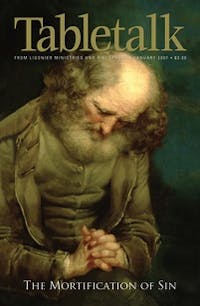
Request your free, three-month trial to Tabletalk magazine. You’ll receive the print issue monthly and gain immediate digital access to decades of archives. This trial is risk-free. No credit card required.
Try Tabletalk NowAlready receive Tabletalk magazine every month?
Verify your email address to gain unlimited access.
What would our worship be like apart from the hindering effects of sin? Each of us experiences those bumpy moments along the way — Sunday mornings that truly compete with our desire to be in worship. We come to church burdened by the weight of trying to get our families there on time, burdened by the cares of the world — but most of all, burdened by the sins of the week with which we have not dealt. We drag all this behind us like a weight, and then, all at once, “Now let us stand and worship the Lord,” the minister says. What’s wrong with this picture?
On the surface, we could say that getting up earlier and to church earlier would help. This is true, but time is not the real obstacle to our worship — sin is. What depletes our motivation in worship is the fact that we too often rush into the presence of God like children coming in dirty from playing just before dinner. Though we may fail to realize it, the sin and dirt of this world clings to us as we come into God’s house for worship. We are reminded of the psalmist’s question, “Who shall ascend the hill of the Lord? And who shall stand in his holy place? He who has clean hands and a pure heart, who does not lift up his soul to what is false and does not swear deceitfully” (Ps. 24:3–4). God is profoundly offended by sin. He is too holy to countenance it; it hinders our worship.
How, then, can we be made clean to enter His presence? Because of Christ and Him alone, we have every right to come into the house of God. For our sakes, Christ “offered himself without blemish to God to purify our conscience from dead works to serve the living God” (Heb. 9:14). In Christ, we have already been made righteous, holy, and cleansed. God, by his great love and mercy, has even declared us to be his own beloved children in Christ (John 1:12–13). We are adopted and have been given a family — the church. Having been united to Christ, we are also united to all those who are in union with him.
This is our true family, those with whom we are making pilgrimage together to God’s heavenly land of rest, and with them we have the great privilege each Lord’s Day of resting at the brook along the way that God has provided to sustain the souls of weary pilgrims. God calls His covenant family to manifest the fact that we have been made righteous, holy, and cleansed in Christ. This requires that we not leave sin between us and God, or even between one another. God tells us that when we sin against Him or one another, we have a very simple and clear obligation: to confess our sins.
Even to speak of confessing sin rings of Roman Catholicism in the ears of many. After all, who confesses sin anymore? To whom would we confess our sins? Scripture is not without helpful answers to these questions, and it points us to several aspects of confession. The first is corporate confession of sin. Many churches employ a reading of God’s law early in the service so that the church might pause to consider that she is once again in the presence of a holy God who is to be revered. This is usually followed by a prayer of confession and an assurance of pardon whereby we are reminded that though we have broken God’s covenant, God will hear our confession and “forgive us our sins and cleanse us from all unrighteousness” (1 John 1:9) so that we might worship Him.
The second aspect of confession is between members of the church and their elders. There is plenty of talk in churches today about accountability groups, accountability partners, accountability conferences, and the like. These things may have their place, but they should not be allowed to supplant the role of elders in the life of the church. God has given us elders to bear our burdens in prayer, to instruct the church where needed, and yes, to provide accountability (Heb. 13:17). They don’t forgive our sins for God, but they do remind us of God’s forgiving grace, and as under-shepherds, they should always point us to our heavenly Shepherd.
The last aspect of confession for our consideration is between members of the church. Sin often creeps into our relationships and destroys our unity. This can happen between family members and church members alike. When it does, we become liturgically challenged! We can’t worship when we are mad at one another. We sense our hypocrisy, and loathe the fact that we have too easily used our tongues to tear down those whom we should be building up — and now we sit beside them in worship! Thus, let us consider that when we prepare for worship, we should first make sure that there is no secret sin in our heart from which we are unwilling to turn. We should also make sure there is nothing between us and another family member or Christian. If there is, let us be willing to confess such sin to one another as James 5:16 tells us, and also be willing to forgive those who confess their sins to us. In this way, our communion with God and one another will not be hindered, and when we come to God’s house for worship, we can leave the dirt outside.
